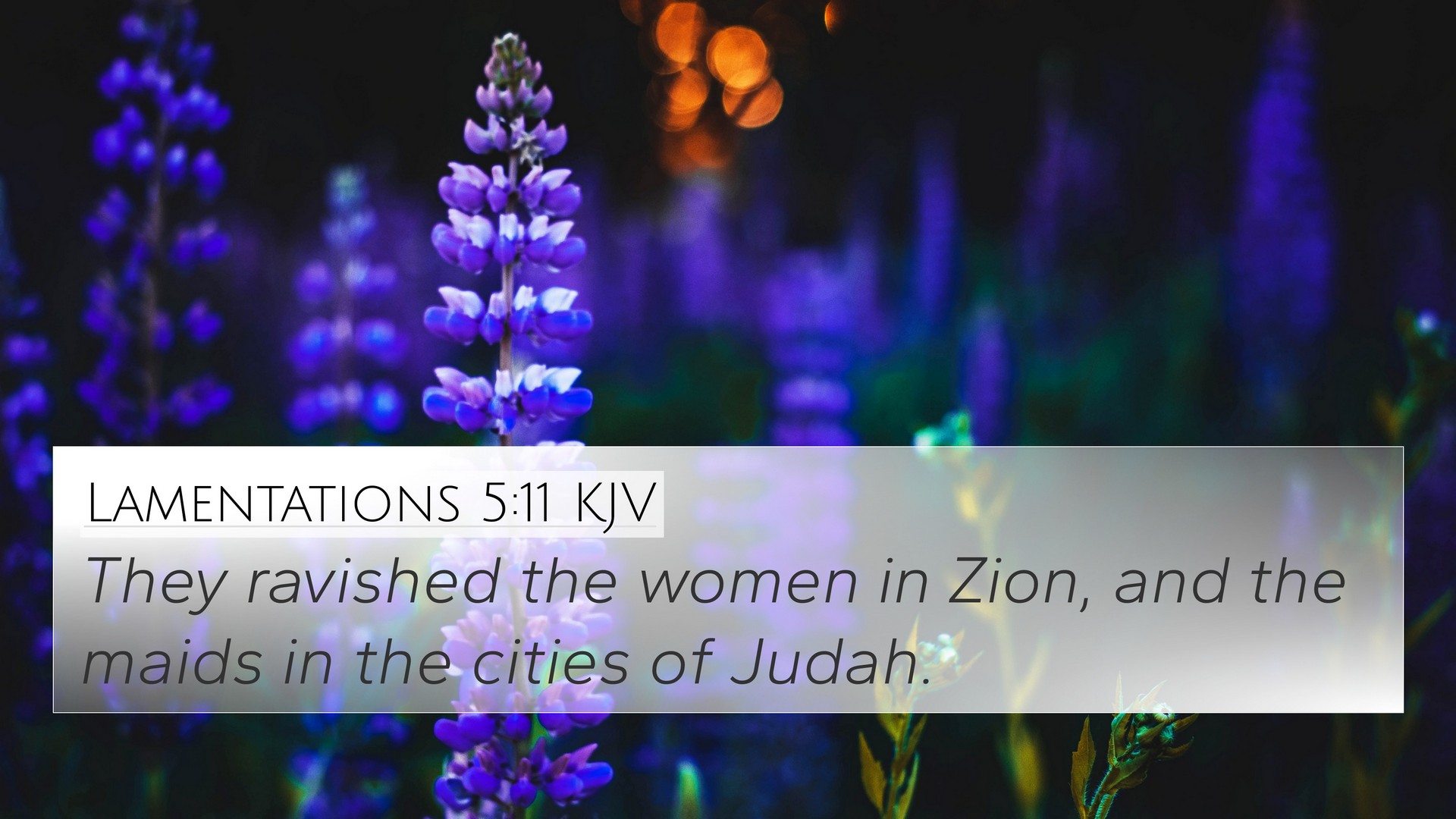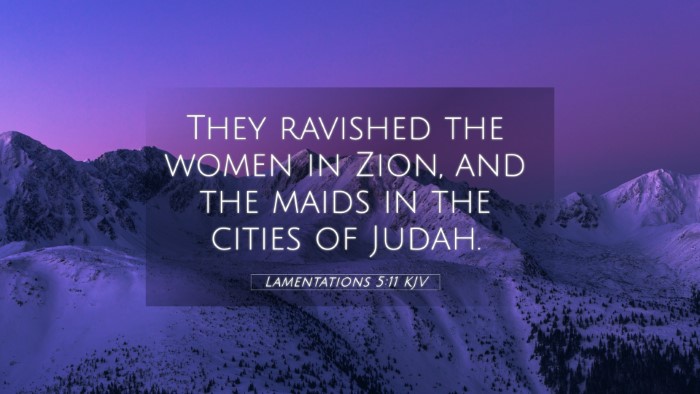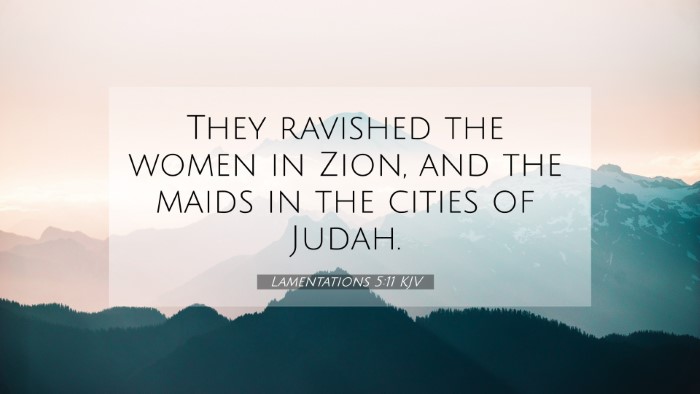Meaning of Lamentations 5:11
Lamentations 5:11 states, "They ravished the women in Zion, and the maids in the cities of Judah." This verse captures the profound sorrow and devastation experienced by the people of Israel following the fall of Jerusalem. The lament, articulated through vivid imagery, invokes a deep sense of suffering and loss.
Summary of Insights from Commentaries
The following are compiled insights from public domain commentaries regarding this verse:
- Matthew Henry: Henry emphasizes the moral decay that precedes the physical destruction, noting that such violence was a judgment upon the nation for their unfaithfulness to God. He draws attention to the communal grief and shames bestowed upon the women, who represent the vulnerability of the nation during times of crisis.
- Albert Barnes: Barnes points out the historical context of this verse, linking it to the siege of Jerusalem. He highlights the brutality faced by the women as a symbol of the broader calamity befalling the nation. The verse serves as a reminder of the consequences of sin and rebellion against God.
- Adam Clarke: Clarke provides a theological interpretation, arguing that the violence against women signifies the complete breakdown of societal order. He suggests that such acts highlight not only physical destruction but also the spiritual ruin that accompanies a nation’s disobedience to God's commands.
Contextual Relevance and Cross-References
This verse resonates deeply with several other Scriptures that address themes of suffering, judgment, and the consequences of sin. Below are key cross-references that enhance the understanding of Lamentations 5:11:
- Isaiah 13:16: "Their children also shall be dashed to pieces before their eyes; their houses shall be spoiled, and their wives ravished." - This verse reflects similar imagery of devastation and the fate of women during war.
- Jeremiah 30:14: "All thy lovers have forgotten thee; they seek thee not; for I have wounded thee with the wound of an enemy, with the chastisement of a cruel one." - This underlines the abandonment and suffering that results from turning away from God.
- Ezekiel 22:10-11: "In thee have they discovered their fathers’ nakedness: in thee have they humbled her that was set apart for pollution." - It draws parallels to the dishonor and degradation experienced, emphasizing moral decay.
- 2 Kings 25:7: "And they slew the sons of Zedekiah before his eyes, and put out the eyes of Zedekiah, and bound him with fetters of brass." - This depicts the tragic consequences of the siege and the loss of dignity faced by the leadership and their families.
- Lamentations 5:1: "Remember, O Lord, what is come upon us: consider, and behold our reproach." - The call for divine attention to suffering echoes through the entire lament, tying the opening to the specific sorrows detailed later.
- Micah 3:10: "They build up Zion with blood, and Jerusalem with iniquity." - This further illustrates how sin leads to societal corruption and ultimate calamity.
- Amos 1:13: "Thus saith the LORD; For three transgressions of the children of Ammon, and for four, I will not turn away the punishment thereof; because they have ripped up the women with child of Gilead." - Similar themes of violence against women are presented here, suggesting a divine reckoning for iniquity.
Understanding the Thematic Connections
The suffering depicted in Lamentations 5:11 can be explored through thematic Bible verse connections, providing a comprehensive view of how such themes are interwoven throughout Scripture.
Connecting Themes of Suffering and Judgment
Throughout the Bible, suffering often serves as a motif linked to divine judgment. The cross-references listed not only provide contextual explanations but also show how the experiences of Israel reflect broader Biblical principles about the consequences of sin:
- Examples from Old Testament prophecies highlight the repercussions faced by nations that stray from God's covenant.
- In the New Testament, teachings on suffering and endurance, like Romans 5:3-4, suggest that trials serve to strengthen and build character, resonating with the historical reflections found in Lamentations.
Inter-Biblical Dialogue
The interplay between different verses facilitates a deeper understanding of the Scriptures. Here are some methods for exploring those connections:
- Bible concordance: Utilize a concordance to find related verses that speak on violence, judgment, and suffering.
- Cross-reference Bible study: Engage in studies that focus on thematic explorations, such as the impact of sin throughout the Biblical narrative.
- Bible reference resources: Make use of scholarly tools and commentaries that provide insights into the connections between various Biblical texts.
Conclusion
In summary, Lamentations 5:11 not only conveys the historical lament of a nation in turmoil but also serves as a rich source for thematic Bible verse connections, encouraging deeper reflection on the nature of sin, suffering, and divine judgment. By utilizing tools for biblical cross-referencing, one can uncover the intricate relationships between different passages, shedding light on the overarching narratives in Scripture.





